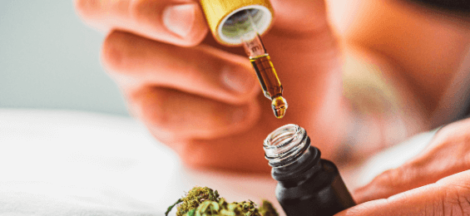Are you one of the many people who have recently discovered the benefits of CBD oil? Whether you’re using it to alleviate pain, reduce anxiety or improve sleep quality, there’s no denying that this natural remedy has taken the world by storm. But have you ever wondered how long does CBD oil stay in your system? This is a common question among users and for good reason. Understanding its longevity can help optimize your dosage and ensure that you’re not at risk for any unwanted side effects. In this blog post, we’ll explore everything you need to know about CBD oil’s staying power in your body!
What is CBD oil?
CBD oil is derived from the cannabis plant, specifically from its hemp flowers. Hemp plants are known for their high CBD content and low THC levels, which makes them ideal for producing CBD products that won’t cause psychoactive effects. Unlike marijuana-derived CBD products, CBD oil extracted from hemp is legal in most countries.
The main active ingredient in CBD oil is cannabidiol (CBD), a non-psychoactive compound with many potential health benefits. This natural remedy has been found to help alleviate symptoms of various conditions such as chronic pain, anxiety, depression and more.
CBD oil comes in different forms including tinctures, capsules and topicals. Tinctures are the most common form of consumption where droplets are placed under the tongue or mixed into drinks while capsules offer an easy way to include it in your daily supplement routine.
It’s important to note that not all types of CBD oils are created equal; some contain other cannabinoids like THC while others have undergone additional processing that may alter its properties or purity level. It’s essential to purchase high-quality products from reputable sources to ensure you’re getting a safe product with accurate labeling information.
The different types of CBD oil
CBD oil comes in different types, varying in quality and potency. The three primary types of CBD oil include full-spectrum CBD, broad-spectrum CBD, and CBD isolate.
Full-spectrum CBD contains all the natural compounds found in hemp plants such as terpenes, flavonoids, cannabinoids including THC (tetrahydrocannabinol). Broad-spectrum CBD also includes these compounds but with no THC content. On the other hand, CBD isolate is a pure form of cannabidiol consisting solely of 99%+ pure cannabidiol compound.
While full-spectrum and broad-spectrum contain multiple plant extracts that work together to produce an entourage effect where each component potentiates its effect when combined with others; users can still opt for isolate if they want purely a therapeutic benefit without any psychoactive effects.
It’s important to choose the right type of oil based on your needs or medical condition. However, it is best to consult with a doctor before using any kind of cannabis product especially if you’re currently taking prescription medication or have underlying health conditions.
How long does CBD oil stay in your system?
Once you take CBD oil, it enters your bloodstream and starts to interact with your body’s endocannabinoid system. As a result, the amount of time it stays in your system can vary depending on several factors.
One of the most significant factors that affect how long CBD oil stays in your system is the method of consumption. If you ingest CBD oil orally or apply it topically, it will likely stay in your system longer than if you inhale it through vaping.
Another crucial factor is the dosage. Higher doses of CBD oil will typically take longer to leave your body than lower doses.
Your unique physiology also plays a role in determining how long hemp-derived products remain detectable in your bloodstream. Factors such as age, weight, and metabolism can all influence how quickly or slowly cannabinoids are metabolized by an individual’s body.
Various drug tests have different detection windows for substances like THC that might be present even when taking pure CBD products. While some tests may only detect recent use (a day or two), others can identify traces up to several weeks later.
Pros and Cons of CBD oil
CBD oil has been gaining popularity due to its potential health benefits, but like any other supplement or medication, it has its pros and cons.
On the positive side, CBD oil may help alleviate symptoms of anxiety and depression by interacting with serotonin receptors in the brain. It can also reduce pain and inflammation as well as improve sleep quality.
However, there are also some potential downsides to using CBD oil. Some people may experience side effects such as dry mouth, dizziness, diarrhea or changes in appetite. Additionally, CBD oil can interact with certain medications so it’s important to talk to a healthcare provider before starting use.
Another consideration is that not all CBD products are created equal. The lack of regulation around dosing and labeling means that consumers need to be cautious about what they’re purchasing and consuming.
While there are certainly benefits to using CBD oil for certain conditions or symptoms, it’s important to weigh both the pros and cons before making a decision about whether or not it’s right for you.
How to use CBD oil
When it comes to using CBD oil, there are a few things you should keep in mind. First and foremost, always consult with your doctor before adding any new supplement to your routine. Once you have the go-ahead, consider starting with a low dose of CBD oil and gradually increasing as needed.
One popular way to use CBD oil is by placing drops under the tongue and holding them there for around 30 seconds before swallowing. This method allows for quicker absorption into the bloodstream.
Another option is mixing CBD oil into food or drinks. Keep in mind that this may result in slower onset time compared to sublingual administration.
Topical applications such as creams or balms can also be effective for localized relief from pain or inflammation.
It’s important to note that everyone’s body reacts differently to CBD, so finding the right dosage and method of administration may take some trial and error. However, when used correctly, many people find that CBD oil can provide numerous health benefits without causing significant side effects.
Alternatives to CBD oil
While CBD oil has become increasingly popular in recent years, there are still those who may be hesitant to try it or prefer to explore alternative options. Here are some alternatives to CBD oil that you might consider:
- Essential oils – Essential oils have been used for centuries for their therapeutic properties and can offer similar benefits to CBD oil such as reducing anxiety and promoting relaxation.
- Meditation – Meditation is a natural way of reducing stress and anxiety without the need for any external substances. Incorporating meditation into your daily routine can help promote greater mindfulness, reduce stress levels, and improve overall well-being.
- Exercise- Regular exercise releases endorphins which can provide a natural mood boost, ease pain and inflammation, lower blood pressure and help alleviate symptoms of depression.
- Acupuncture – Acupuncture involves the insertion of thin needles into specific points on the body’s meridian lines to stimulate healing responses in the body that promote pain relief and relaxation.
While these alternatives may not work for everyone, they offer individuals different avenues to explore when looking for ways to improve their health and wellness naturally without relying solely on medications or supplements like CBD oil.
Conclusion
CBD oil has become increasingly popular due to its potential benefits for various health conditions. While the effects of CBD oil can vary depending on multiple factors such as dosage, frequency of use, metabolism and body weight, it is generally known that it stays in your system for several days or even weeks.
It is important to note that while CBD oil may have some potential health benefits, research is still ongoing and it may not work the same way for everyone. It’s also essential to buy high-quality products from reputable brands and follow recommended dosages.
If you are considering using CBD oil for any condition, make sure to consult with a healthcare professional first. They can help you determine whether or not it’s appropriate for your specific needs and provide guidance on how to use it safely.
When used responsibly and under medical supervision, CBD oil appears to be a promising natural remedy with great potential.





 CBD for Dog Seizures: A Comprehensive Guide
CBD for Dog Seizures: A Comprehensive Guide